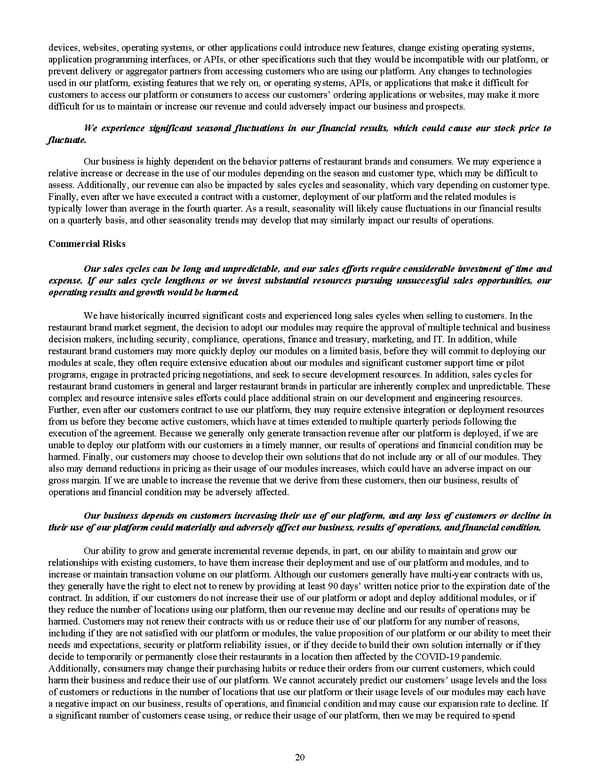devices, websites, operating systems, or other applications could introduce new features, change existing operating systems, application programming interfaces, or APIs, or other specifications such that they would be incompatible with our platform, or prevent delivery or aggregator partners from accessing customers who are using our platform. Any changes to technologies used in our platform, existing features that we rely on, or operating systems, APIs, or applications that make it difficult for customers to access our platform or consumers to access our customers’ ordering applications or websites, may make it more difficult for us to maintain or increase our revenue and could adversely impact our business and prospects. We experience significant seasonal fluctuations in our financial results, which could cause our stock price to fluctuate. Our business is highly dependent on the behavior patterns of restaurant brands and consumers. We may experience a relative increase or decrease in the use of our modules depending on the season and customer type, which may be difficult to assess. Additionally, our revenue can also be impacted by sales cycles and seasonality, which vary depending on customer type. Finally, even after we have executed a contract with a customer, deployment of our platform and the related modules is typically lower than average in the fourth quarter. As a result, seasonality will likely cause fluctuations in our financial results on a quarterly basis, and other seasonality trends may develop that may similarly impact our results of operations. Commercial Risks Our sales cycles can be long and unpredictable, and our sales efforts require considerable investment of time and expense. If our sales cycle lengthens or we invest substantial resources pursuing unsuccessful sales opportunities, our operating results and growth would be harmed. We have historically incurred significant costs and experienced long sales cycles when selling to customers. In the restaurant brand market segment, the decision to adopt our modules may require the approval of multiple technical and business decision makers, including security, compliance, operations, finance and treasury, marketing, and IT. In addition, while restaurant brand customers may more quickly deploy our modules on a limited basis, before they will commit to deploying our modules at scale, they often require extensive education about our modules and significant customer support time or pilot programs, engage in protracted pricing negotiations, and seek to secure development resources. In addition, sales cycles for restaurant brand customers in general and larger restaurant brands in particular are inherently complex and unpredictable. These complex and resource intensive sales efforts could place additional strain on our development and engineering resources. Further, even after our customers contract to use our platform, they may require extensive integration or deployment resources from us before they become active customers, which have at times extended to multiple quarterly periods following the execution of the agreement. Because we generally only generate transaction revenue after our platform is deployed, if we are unable to deploy our platform with our customers in a timely manner, our results of operations and financial condition may be harmed. Finally, our customers may choose to develop their own solutions that do not include any or all of our modules. They also may demand reductions in pricing as their usage of our modules increases, which could have an adverse impact on our gross margin. If we are unable to increase the revenue that we derive from these customers, then our business, results of operations and financial condition may be adversely affected. Our business depends on customers increasing their use of our platform, and any loss of customers or decline in their use of our platform could materially and adversely affect our business, results of operations, and financial condition. Our ability to grow and generate incremental revenue depends, in part, on our ability to maintain and grow our relationships with existing customers, to have them increase their deployment and use of our platform and modules, and to increase or maintain transaction volume on our platform. Although our customers generally have multi-year contracts with us, they generally have the right to elect not to renew by providing at least 90 days’ written notice prior to the expiration date of the contract. In addition, if our customers do not increase their use of our platform or adopt and deploy additional modules, or if they reduce the number of locations using our platform, then our revenue may decline and our results of operations may be harmed. Customers may not renew their contracts with us or reduce their use of our platform for any number of reasons, including if they are not satisfied with our platform or modules, the value proposition of our platform or our ability to meet their needs and expectations, security or platform reliability issues, or if they decide to build their own solution internally or if they decide to temporarily or permanently close their restaurants in a location then affected by the COVID-19 pandemic. Additionally, consumers may change their purchasing habits or reduce their orders from our current customers, which could harm their business and reduce their use of our platform. We cannot accurately predict our customers’ usage levels and the loss of customers or reductions in the number of locations that use our platform or their usage levels of our modules may each have a negative impact on our business, results of operations, and financial condition and may cause our expansion rate to decline. If a significant number of customers cease using, or reduce their usage of our platform, then we may be required to spend 20
 2022 10K Page 26 Page 28
2022 10K Page 26 Page 28